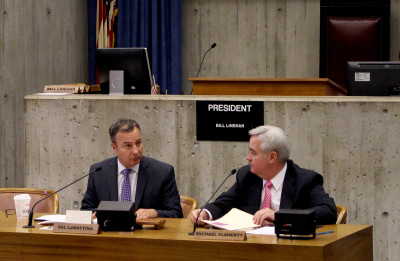
Entertaining the possibility of legalizing recreational marijuana, the Boston City Council met Tuesday to discuss amending the text of the Boston Zoning Code to accommodate marijuana dispensaries.
The council’s proposed amendment would limit the placement of any medical or recreational marijuana dispensary to no closer than 2,500 feet from any other dispensary, according to a document provided at the hearing.
“We need to have a conversation about the zoning codes and how to define them,” said Jerome Smith, chief of civic engagement for the City of Boston.
City Councilor Michael Flaherty sponsored the amendment and cited evidence from other cities to support the amendment. He said that in Baltimore, the allowed distance is also 2,500 feet and in Tucson, Arizona, the distance is 2,000 feet.
Jeff Hampton, the deputy director of zoning for the Boston Redevelopment Authority, also attested to the need for distance between each dispensary. He said the dispensaries should “not saturate one particular community.”
In 2012, Massachusetts residents voted to allow the use of medical marijuana. The State Legislature consequently enacted a law requiring that at least one treatment center, but no more than five, should be located in each county.
The need for medical marijuana dispensaries is apparent because there are already 12,396 qualified and registered patients in Boston, said Lisa Conley of the Boston Public Health Commission.
Conley called the process of applying for a dispensary “a multistage process that has many steps.”
The organization applying would first have to go through the zoning process, and then if they satisfy all state and city requirements, they go to the BPHC. There is an inspection prior to opening, three unannounced inspections, a community meeting and several other detailed processes.
There are currently three medical marijuana dispensaries in Massachusetts, none of which are in Boston.
Boston City Council Senior Legislative Assistant Corinne Walsh said efforts to amend zoning were introduced in anticipation of the legalization of marijuana in 2016. Regulations need to be put in place, she said, if marijuana dispensaries act like retail stores.
“If recreational marijuana is legal it could just become a retail store, so there’s all kinds of conditional uses under the zoning code that businesses have to get approval for,” Walsh said. “If medical marijuana is just another retail store [the committee] needs to figure out how they will regulate that.”
Flaherty echoed those concerns: “We don’t want cannabis cafes and shops opening up in the business district,” he said.
Rosemarie Sansone , president and CEO of the Downtown Boston Business Improvement District Corporation, testified during the meeting, and spoke about how there is only one Zoning Board of Appeal-approved medical marijuana dispensary, which is sited to be at 21 Milk St. and is scheduled to open in early 2016.
“I had the opportunity to meet with and listen to many individuals who raised concerns regarding Boston’s first medical marijuana facility,” Sansone said. “From operators to historic sites, to those who ran day care centers to residents who had chosen this neighborhood as their home, to live in, people did not feel Milk Street, in the heart of a historic and financial district on the Freedom Trail was a logical choice.”
While she may not agree about the location, Sansone said she still supports the amendment to the code because she believes it will add “sanity” and “logic” to the issue.
“I believe that no one wants to see entire streets in any neighborhood dotted with marijuana dispensaries, whether medical or recreational,” Sansone said.
Olivia Owens, 18, of New Bedford, attended the hearing. She said she found the information helpful.
“I did not know that this had to do with recreational marijuana use,” she said. “They’re trying to set up recreational use in a way that doesn’t interfere with medical marijuana dispensaries.”
Rick McAdoo, 61, of Brighton, did not attend the hearing, but disagreed with amending the zoning codes and said there should be as many dispensaries as people please.
“If they want to have one in Kenmore Square and another one over on [Massachusetts Avenue] and another one somewhere else, that’s fine,” he said. “The people have said we don’t want to keep things out.”





















































































































